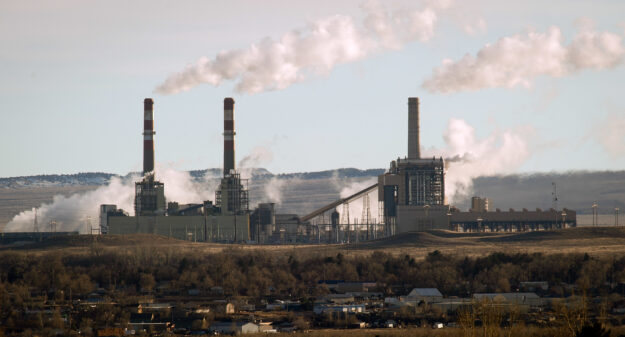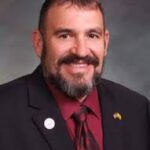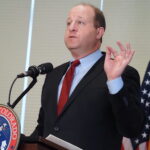Widgetized Section
Go to Admin » Appearance » Widgets » and move Gabfire Widget: Social into that MastheadOverlay zone
Energy policies, climate change at forefront of Colorado’s rural-urban divide

As Colorado races toward a “renewable” energy future, rural lawmakers like Ty Winter argue it is leaving its backbone behind — the ranchers, coal miners and oil field workers who, without a voice at the state Capitol in Denver, now face economic extinction, despite having powered its rise.
For Winter, Colorado’s rural-urban divide boils down to energy — both producing it and then using it to build things that people want and need in the cities. Such production, he insists, is invaluable for maintaining a sense of pride for residents of rural parts of the state.

“Rural Colorado, for the longest time, we feed, we heat, and we clothe the city,” said Winter, a fourth-generation Republican rancher in Las Animas County and funeral home operator in Trinidad.
“That’s just all there is to it, and we’re good at doing it. What makes it hard is our jobs are being cut by legislation passed in the Capitol building,” added Winter, who represents House District 47, which covers rural areas of Southeast Colorado.
In 2018, when voters rejected greater setback distances for oil and gas drilling operations in Proposition 112, Winter said Gov. Jared Polis and Democratic lawmakers circumvented the will of the people by passing Senate Bill 181 the year after to regulate the state’s oil and gas industry more intensely.
“What we face now is that they’ve phased out our jobs with coal, steel, oil and gas, and they don’t have any replacements for those jobs,” said Winter, who is now the assistant minority leader in the state House.
Colorado governor: ‘I am doing it right’
Polis defended the push to rapidly transition away from fossil-fired energy, arguing the renewables industry will fuel jobs and satisfy the region’s increasing need for electricity. He told Colorado Politics that, while energy sources evolve, change is hard, and for some, the transition can be uncomfortable.
Still, energy in Colorado is essential, he said, and during a Western Governors’ Association conference in Santa Fe in June, several executives, including Polis, agreed that it would be the Western states leading the way in providing energy to most of the country.

Polis said its no secret that he ran on increasing renewable energy production.
“The renewable energy economy has enormous benefits for rural Colorado because that’s where the energy that powers our cities, and suburbs ain’t going to be made in Denver,” the governor said.
While the reduction in coal mines and move away from gas and oil has some understandably nervous, Polis said the transition to renewable energy will create jobs — to construct plants and operate them. The options are also extensive, he stressed, pointing to wind, solar and the excitement over geothermal opportunities.
Republican leader: Colorado policymakers killed rural jobs
Rural leaders like Winter aren’t persuaded.
Winter derisively called Colorado’s Office of Just Transition “the office of not so just transition,” referring to the state’s shift to renewable energy, which critics say is happening too fast, but which supporters argue is necessary to wean the state — and America — from fossil energy.
“My people need those jobs because the legislatures have killed their way to make a living,” Winter said. “Now, they’ve hooked them on government money like a drug, and they’ve taken their livelihood and their pride away.”
While some analysts say rural areas would be hit hardest with Congress passing President Donald Trump’s signature budget bill, Winter believes it will help herald efforts to restore pride and self-reliance in non-urban America.
“A lot of people in rural Colorado realize that this is a Band-Aid that’s going to have to get ripped off,” Winter said. “They’re looking out for their kids because they see the unsustainability of Colorado and America — that you can only print so much money and you can only fund so much before the rubber hits the road.”
While only roughly 200 miles south of Denver along Interstate 25, Winter said Trinidad is a world apart in values. Trinidad currently has a population of 8,300, while Denver is home to about 730,000.
Pueblo, with a population of 111,000, is the closest “big city” to Trinidad. Winter noted that it used to be a state hub for steel and manufacturing, until those jobs were shipped overseas.
Part of Winter’s House district is located in Pueblo, which is also the largest city in the state’s massive 3rd Congressional District, encompassing most of southern and western Colorado.
Producers and consumers: the urban-rural divide
Democrat Adam Frisch, an Aspen businessman and former city councilmember, argues that of Colorado’s 64 total counties, a dozen or so of the most populous or wealthiest counties, including Denver, Boulder, Pitkin, Eagle and San Miguel, are “consuming counties.”
“That’s the consumerism that makes the world go round,” said Frisch, who has criss-crossed Pueblo and the towns of the 3rd Congressional District after running unsuccessfully in the last two election cycles.
“The other counties that are not there are on the producer side of things, and the producers understand you need a consumer,” he said. “The consumer class seems to forget too often how hard it is and what it takes to be a producer.”
He added: “The food at the grocery store just doesn’t come out of aisle five at Whole Foods. The water just doesn’t come out of the tap. And the energy that people are living by does not come out of the gas pump or the outlet in your house.”
The Democratic Party is totally off-brand when it comes to speaking to the rural voters, Frisch said, adding he learned that while traveling the conservative-leaning 3rd District.
“The Democratic Party has become what I call the ‘shame on you party,’” Frisch said. “Like, don’t eat that food, don’t drive that car, don’t work in that industry, don’t use that pronoun, don’t use that word. So, the voter can’t get to the economic policies that are probably better for their family when they feel like they’re being completely disrespected about how they’re living their lives.”
Jon Stavney, executive director of the Northwest Colorado Council of Governments and a former county commissioner from Eagle County, disputes the notion that cities aren’t part of Colorado’s overall production economy.
Still, he said, he understands why people want to produce energy, mine materials, and manufacture and agricultural products, no matter where they live.
“It’s the conceit that things aren’t produced in urban areas, which is ridiculous,” Stavney said. “But it’s a pride thing. You want to be able to do something. For the steel belt, it’s the pride of having been a part of something that’s no longer there. They don’t want to be consumers of government funding in rural America. And they don’t want to think of themselves that way. Nobody wants to think of themselves that way.”
A nuclear-powered rural revival?
While Colorado is the fourth-largest oil-producing state in America, which set the global record for oil production last year, many of the state’s mining and manufacturing jobs have been offshored to China.
Winter sees the situation as an opportunity to recapture some past glory with tech jobs powered by nuclear power.
The push by Polis and Colorado Democrats for a carbon-free society has come at a price, not just to what could be an even more robust oil and gas sector in Colorado, but also in terms of reliable, cheaper, baseload power that’s available 24/7, Winter argued.
“For the longest time, Republicans have been blamed for lining the pockets of oil, and now we’re seeing the same thing; it’s just changed hands,” Winter said. “I think the Dems are lining the pockets of wind and solar, and, first and foremost, it’s not baseload power that we need to power HB this state.”
Stabilizing that baseload energy mix amid increasing demand, Winter argued, should include nuclear power.
“(Nuclear) makes us economically viable because we say that we’re one of the biggest tech states in the nation, which we are with our aerospace, but at the end of the day, we have data centers wanting to come in and AI firms that want to come in,” said Winter, adding they will need nuclear power.
Winter would like to see a small modular reactor installed at Xcel Energy’s coal-fired Comanche 3 power plant in Pueblo, which is scheduled to shut down in 2031.
Similarly, there’s a push for nuclear power and perhaps even waste storage in Northwest Colorado, which is why state Sen. Dylan Roberts, a Frisco Democrat who was raised in Steamboat Springs, joined Winter in an unlikely political pairing that managed to pass the bipartisan House Bill 1040.
The bill now defines nuclear power as among the “clean” energy resources.
Advocates of nuclear power said the three-year effort by legislators and nuclear power proponents to pass HB 1040 would put Colorado on the path to meeting the state’s goal of 100% “carbon-free” energy by 2040.
Critics, on the other hand, called nuclear energy a “false solution” and a “risky, expensive, and unsustainable technology.”
Joel Johnston, a Denver-based partner at the national law firm Hall Estill, said he worries Colorado’s nuclear bill does nothing to address waste storage and that it will take finding away from geothermal, wind and solar projects.
“The (nuclear) plants that are operating today are generating waste, and there’s no place for that to go. It’s all temporary onsite storage,” Johnston said of the nation’s nuclear power plants that currently produce nearly 20% of the country’s electricity.
“Nuclear has this pretty low social cost. We don’t have to go to other countries, and people aren’t dying fighting over it, and so forth. But it’s got a very high environmental cost,” added Johnston, who specializes in environmental and regulatory issues and large infrastructure projects. “The mining, the processing of it, and the disposal of it — so, this whole clean energy focus really focuses on clean with respect to carbon dioxide, not anything else. And there’s something that gets lost in that, and that’s unfortunate.”
Roberts, who has also been trying to save the “Mountain Rail” Union Pacific line from Craig to Denver with a combination of freight and passenger services, said the railroad giant came to the state because of the looming shutdown of the Craig and Hayden coal-fired power plants.
In those conversations, some of his constituents have told him it makes sense to install small modular nuclear reactors there because the transmission infrastructure is already in place, said the legislator.
Residents of rural Northwest Colorado, Roberts added, want to continue producing power. At townhalls throughout the winter and into the spring, Roberts said he consistently heard from constituents who do not wish for the end of coal to be the end of energy production in Moffat, Rio Blanco, and Routt counties.
“I had military veterans who worked on nuclear submarines and lived on a submarine with a small nuclear reactor who talked about how the modern technology is so much different and the waste storage is so much more safe,” Roberts said. “And then how other countries are doing this and have it as a big part of their portfolio.”
While the bill sponsored by Winter in the House and Roberts in the Senate does not enable any specific projects, it incentivizes investment in a state that is expected to mandate carbon-free electricity within a few decades.
Roberts agreed that data centers and artificial intelligence hubs need nuclear power.
“Yeah, it’s got to get powered somehow,” Roberts said of the tech sector and the shift in attitudes toward nuclear power. “That’s also reflected in the pretty overwhelming vote that (the bill) received in both the House and the Senate. Republicans and Democrats alike supported this bill, and the governor signed it, obviously, so I think times are changing.”
Frisch said there is “no math to decarbonize without nuclear” and that both political parties — one seen as largely rural and the other as urban — both get things wrong about the climate conversation.
“There are so many Republicans that don’t understand the science of the climate crisis, but a lot more Democrats don’t understand the math of how much energy and power is needed to produce the society that people live in,” Frisch said. “And those people in Denver and Aspen and Telluride, I guarantee you, they use 10 times as much energy per capita than the men and the women digging out coal or natural gas or oil, per capita.”
Editor’s note: A version of this story first ran in the Colorado Springs Gazette with Polis interview conducted by the Gazette’s Thelma Grimes.


